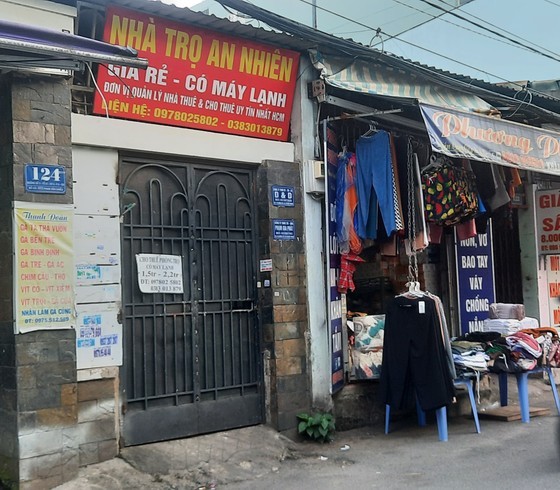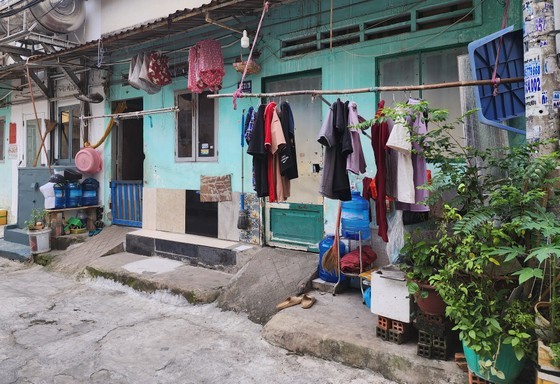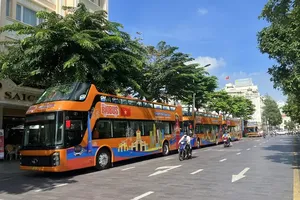 |
Empty rooms for rent in HCMC are seen as unemployed workers return hometowns |
Amid the economic crisis, many companies exporting leather shoes and clothes in districts 12, Binh Tan, Go Vap, Thu Duc City have to shrink production and lay off workers every day. At the end of this year, many unemployed workers decided to return to their hometowns, leaving scores of empty rooms for rent and homeowners must struggle to make ends meet.
In Go Vap District, more and more tenants have left their rented accommodation to return to their hometowns. Therefore, posters of cheap rooms for rent with full amenities to attract customers are easily seen on Pham Van Chieu, Le Van Tho, Le Duc Tho streets, but these rooms are still deserted.
Ms. Nguyen Thi Ngoc Ha and her husband from the Central Province of Quang Binh renting a room on Pham Van Chieu Street are also gradually moving their belongings to return to their hometown in a few days. Ms. Ha is a worker at a garment company, but in recent months the company's orders were halved so she worked less and received unstable wages; she has had to do several other jobs to earn more income.
Meanwhile, Ms. Ha's husband also registered to become a driver of a ride-hailing firm in the evening to earn more income after working at the factory. Even though they worked hard, they didn't earn much money, so they decided to return home to find a new job.
According to her, living in the city, she has to pay for food, accommodation, and transportation every month, not to mention her children's school fees. Their salary is not enough for the family's expenses, so they have to return to our hometown. Even though it's difficult in the countryside, they live close to relatives. Moreover, they have a small garden where they can grow vegetables and raise chickens for a daily meal, Ms. Ha said sadly.
Around large industrial zones in Ho Chi Minh City, this situation is even more obvious. Dozens of signs for renting rooms are seen along Tran Thanh Mai Street in Tan Tao A Ward in Binh Tan District as this street is considered the capital for rental rooms as a lot of workers in industrial parks in the region rent. However, this area was desolate this time with no tenants.
45-year-old Pham Thi Trang, an owner of a cluster of renting houses in Tan Tao A Ward, said that currently up to a dozen vacant rooms have not been rented yet. Recently, workers in the cluster of renting rooms have been laid off and they could not get a job, so they are no longer able to pay living expenses. Therefore, many people decided to return to their hometowns to find new jobs.
 |
A cluster of rental rooms in Thu Duc |
Ms. Trang moaned that no one had come to rent a room in the cluster of rental rooms for half a year and they were empty. Every year, there are only one or two rooms empty, but from the beginning of the year until now, the rooms have been empty for a long time. She is now also looking for another job to have more expenses to cover the family's expenses.
Also at a nearby cluster of renting houses, Mr. Dinh Van Phuoc - an owner of 20 rooms, said that a slowdown in economic growth led to his family's income from renting rooms reduced by nearly ten million Vietnamese dong.
Mr. Phuoc disclosed that many tenants in his cluster of renting houses are mainly workers working in industrial parks, but because businesses are starting to cut workers' hours, forcing people into part-time roles; plus, many people still quit their jobs, they asked for their deposit back to move back to their hometown. she has to proactively reduce the rents on room by a few hundred thousand Vietnamese dong for these rooms with prices from VND1.1 million (US$45) to VND1.3 million to keep tenants.
Mr. Phuoc also added that he is preparing to work as a motorcycle taxi driver to have money to pay banks’ interest because he previously had to borrow a lot to invest in rooms for rent.
Many landlords accept rent reductions of 20 percent -30 percent to attract new tenants. For long-term tenants who unfortunately lose their jobs or have their working hours cut, the landlord sympathized with their plight and allowed them to pay in installments or owed rent for 1-2 months.
Some landlords also repaired rooms to make them more spacious and install more amenities such as wifi and private parking areas to attract tenants.
























